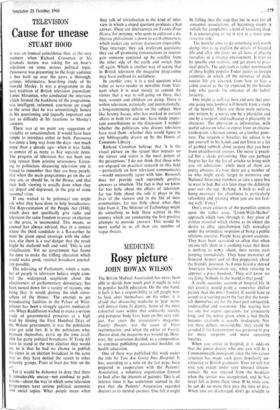Cause for unease
TELEVISION STUART HOOD
It was an ironical coincidence that, at the very moment when Richard Crossman in his Granada lecture was asking for an hour's
television on some serious political topic, Panorama was presenting to the large audience
it has built up over the years a thorough, serious, informative, hour-long study of Sir Oswald Mosley. It was a programme in the best tradition of British television journalism.
James Mossman, who conducted the interview which formed the backbone of the programme, was intelligent, informed, courteous yet tough in the sense that he was unremittingly honest in his questioning and (equally important and just as difficult) in his reactions to Mosley's answers.
There was at no point any suggestion of triviality or sensationalism. It would have been simple to introduce either or both. Panoranza
has come a long way from the days—not much more than a decade ago—when it was liable to consist of as many as five separate items.
The progress of 'television has not been one long retreat from pristine seriousness. Listen- ing to politicians discussing television one is forced 'to remember that they are busy people, that when the main programmes go on the air
they are, or should be, in the House, and that their bulk viewing is usually done when they are doped and depressed, in the grip of some seasonal virus.
If one wished to be polemical one might ask what they have done to help broadcasters.
The Representation of the People Act (1948), which does not specifically give radio and television the same freedom to cover an election as the press, is unamended. This means, so counsel has always advised, that in a contest where the third candidate is a flat-earther he must be given equal coverage with the other two, else there is a real danger that the result might be declared null and void. This is real trivialisation. Yet no government has found the time to make the trifling alteration which would make good, rational broadcast journal- ism possible.
The televising of Parliament, which a num- ber of people in television believe might com- bat the widespread scepticism about the
effectiveness of parliamentary democracy, has been turned down for a variety of reasons, one being that 'it would destroy the club atmo- sphere of the House.' The attempt to get broadcasting facilities in the Palace of West- minster has been a struggle against mediaeval- ism. When Rediffusion wished to make a serious study of governmental processes at a high level by filming the First Hundred Days of the Wilson government, it was the politicians who got cold feet. It is the politicians who, between themselves, carve up the time avail- able for party political broadcasts. If Tariq Ali were to stand at the next election they would see to it that he had no chance to publish his views in an election broadcast in the same Way as they have denied the screen to other minority groups. Frost at least put him on the air.
Yet it would be dishonest to deny that there is considerable unease—not confined to poli-
ticians—about the way in which some television programmes treat serious political, economic and social topics. What people mean when
they talk of trivialisation is the kind of inter- view in which a stupid question produces a bad
answer. There are interviewers on Twenty-Four Hours, for instance, who seem to cultivate a de- liberate philistinism, a down-to-earth obtuseness,
which makes any serious discussion impossible.
They interrupt; they ask irrelevant questions; they cut off promising conversations to interro- gate someone conjured up by satellite from the other side of the earth and switch him off again. Which is another way of saying that in British television the magazine programme may have outlived its usefulness.
In another area, it is a real question what value as news resides in newsfilm from Viet- nam when it is used merely to remind the viewer that a war is still going on there, that men, women and children are dying. There is within television, nationally and internationally. a long-continuing debate on the subject. Men like Jeremy Isaacs, who has worked in current affairs in both rry and Bac, have made impor- tant contributions to the discussion. I wonder whether the politicians who discuss television have read them—whether they would figure in any bibliography drawn up by the House of Commons Library.
Richard Crossman believes that 'it is the visual picture on the screen that impacts on the viewer and vision is the most potent of the perceptions.' I do not think that those who are engaged on practical research in this field —particularly on how television communicates —would necessarily agree with him. Research does not provide such supremely positive answers as intuition. The fact is that we know far too little about the effects of television, far too little about the role it plays in the lives of the viewers and in the life of their communities, far too little about what they take from it. The Minister of Technology might do something to help those centres' in this country which are conducting the first positive attempts to provide answers. This would be more useful to us all than any number of vague threats.














































 Previous page
Previous page